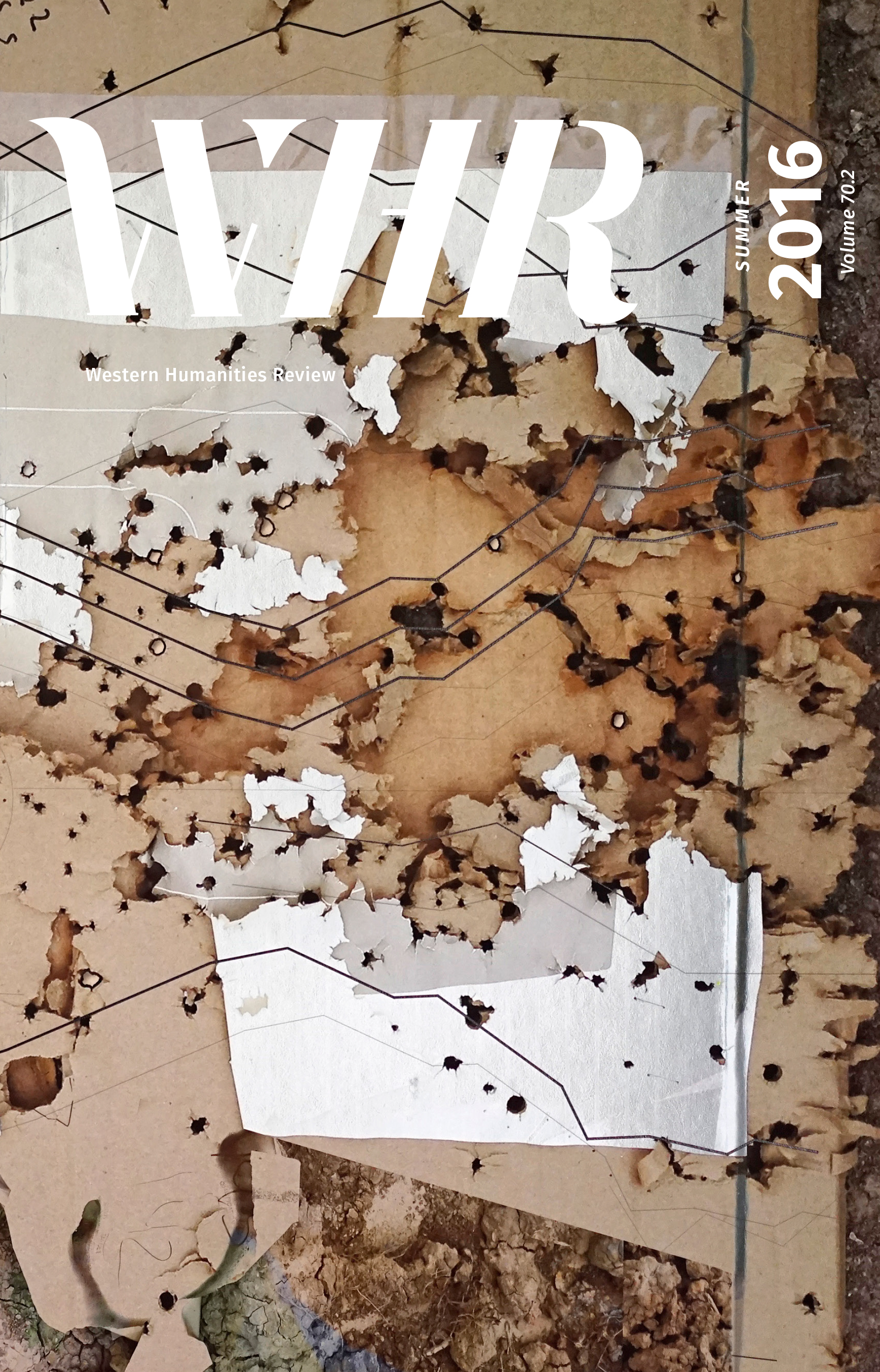Editor & Fiction Editor – Michael Mejia
Poetry Editors – Craig Dworkin, Katharine Coles, Thomas Stillinger
Nonfiction Editors – Stuart Culver, Jeremy Rosen
Managing Editor – Tessa Fontaine
Consulting Editors – Barry Weller, Mindy Wilson
Print Design – Hailey Rabdau
Web Design – Adam Halstrom
Editorial Assistants – Eric Blix, Michelle Donahue, Tyler Goldman, Alen Hamza, Brock Jones, Kevin Priest, Joe Sacksteder
Editorial Board – Scott Black, Vincent Cheng, Norman Council, Karen Lawrence, Michael Martone, Stephen Tatum
Editor’s Note
This issue of Western Humanities Review comes to you from the future.
Careful readers of our cover and masthead will notice that some glitch has occurred, perhaps a space-time accident triggered by one of Stephen-Paul Martin’s characters, who’s bodyhacked him- or herself into the virtual geography of our computers. In any case, what’s happened here is much more serious than those ontological wobbles we sometimes experience crossing time zones while jetting cross-continent.
You are back there in summer 2016, and, yes, you’re hearing our voices here, speaking with fierceness and urgency and tenderness, with a certain liberation and melancholy and hope characteristic of that time, your time, not so different from our own.
Still, it’s true: sometimes you feel so much farther away from us.
You will notice, as you turn the page, that these seemingly familiar voices of the near-future are tinged with the scent of other fires, those of a deeply-set American past that is now rocketing recklessly forward to catch up with and pass us, a history that was always more present than one might have hoped, than one might have wanted to believe.
Ricardo Cortez Cruz will tell you about it—this history of deep and violent inequities in the justice system.
Dilruba Ahmed will tell you about it—this history of corporate influence that perverts political and scientific institutions and the futures they create.
Spoiler alert for our readers back there in summer 2016: He won.
And while that makes some ecstatic and others fearful, it also makes the contents of this issue even more significant as documents of our time—not the “before” or “after,” but a long moment of transition, of political, public, and personal anxiety, when a forward-looking hope has been displaced by a head-spinning uncertainty.
Right now is when we need to closely examine Mexican composer and artist Guillermo Galindo’s projects from America’s southern border: experimental music scores, made in collaboration with photographer Richard Misrach, overwriting desperate architectures of exclusion; haunting musical instruments devised from the detritus shed by humans, our neighbors, testing themselves against brutal landscapes, seeking access to another life on the other side, other possibilities for themselves and their families.
Many of those possibilities, the struggles and successes of Latino immigrants and their children, are represented in the Smithsonian Museum of American Art’s traveling exhibition, Our America: The Latino Presence in American Art, which made a swing through Salt Lake City in the spring and summer of 2015. We are very proud to present to you a portfolio of ekphrastic prose responding to these personal histories and visions, a collection of writings produced by participants in an intense, three-day workshop led by writer Fred Arroyo and organized by poet Francisco Aragón of the Institute of Latino Studies at the University of Notre Dame. We thank them, the Utah Museum of Fine Art, and all the portfolio’s contributors for their hard work and generosity, blending their voices with the artists’ in a most American chorus.
We are grateful, too, to have poet and scholar Peter Cole joining us, performing a dazzling abecedarian essay of letters and language, their mystery, music, and lyric power. And Michael Klauke, too, with his delightful derangement of that foundational American poet, Digger Ellen Poi.
Farewells, declarations, dreams, appreciations, rhapsodies—this issue, for all times, reader, sings curiously and invitingly, and we appreciate, as always, your attendance, at last, and will look forward to your return at our next inspired congress.
Summer 2016 | Volume 70.2
Dilruba Ahmed
Two Poems
Ricardo Cortez Cruz
A Little Warm Death
Laton Carter
Three Poems
Susan Goslee
Two Poems
Molly Damm
Two Poems
Peter Cole
Alphabets of Creation
Donald Platt
Two Poems
James Wells
Two Poems
Kate Berson
Sometimes Kids
PINTURA:PALABRA, A Portfolio of Brief Ekphrastic Prose
Carolina Ebeid
Oldest Story Ever
Cristina Correa
Pilgrim/Peregrino
Stephen D. Gibson
With Wings and Trumpet
Natalia Treviño
Camas para Sueños, Almas Gemelas
Juliana Aragón Fatula
Sin Fronteras
Cristina Correa
Constellation
Laura Bylenok
Rayado
Francisco Aragón
Brothers
Natalie Scenters-Zapico
I Am à la Mode
Alejandro Ramirez
One Year Before the War
Jessica Alexander
A Home Is a Kite
Stephen D. Gibson
College Bookstore Shipping and Recieving: A Couplet
Laura Bylenok
Nocturnal
Cristina Correa
Getting to the Bottom
Alejandro Ramirez
Bad Guys Wear White Hats
Natalie Scenters-Zapico
She is à la Mode
Jessica Alexander
Salazar and the Silver Dollar Bar
Natalia Treviño
Diptych
Stephen D. Gibson
Once I Went to a Wake
Jessica Alexander
All the Other Houses
Laura Bylenok
Fanny Pack: 1919, Portland, Colorado
Natalia Treviño
Chincherias for El Chandelier
Cristina Correa
Speaking with the Pariah
Stephen D. Gibson
Cleave
Juliana Aragón Fatula
Pounding Grapes
Francisco Aragón
Mediterraneo
Guillermo Galindo
Art Feature: Border Cantos
Joshua Unikel
Artist’s Statement
Darin Ciccotelli
Chevy Chase
Stephen-Paul Martin
The Royal Scam
Bruce Bond
Sleep Machine
Michael Klauke
This Ervin
Markus Dickinson
Stories I Tell Myself
Steve Gehrke
The Papers
Toni Mirosevich
Big Wheel


